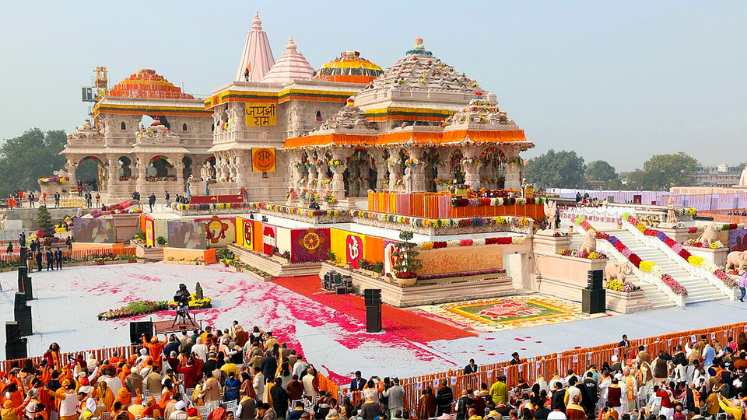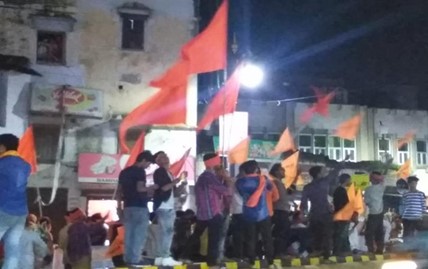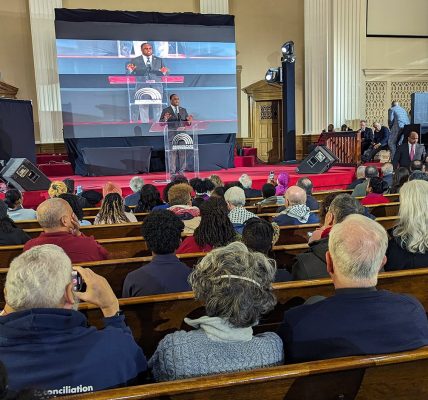Indian president Narendra Modi not too long ago consecrated a Hindu shrine in Ayodhya at a website with a contested non secular historical past. Amit Singh takes a have a look at the secular foundations of India and the way this clashes with Modi’s Hindutva.

Religion can be easily manipulated by political leaders and non secular extremist organisations to demonise and alienate non secular minorities in an effort to acquire political energy. In a society the place non secular animosity between the bulk and minorities is deeply rooted, faith can definitely play a vital function, be it for good or for dangerous. India is an ideal working example! India gained independence from British rule on August 15, 1947 and selected to be a secular democracy. Nonetheless, the Hindu nationalists, followers of Hindutva ideology who consider within the supremacy of the Hindu faith, have been troubled by the secular thought of non secular equality, which gave equal constitutional rights, together with to Muslim non secular minorities. The small however influential Hindu nationalists rejected the idea of secularism, non secular equality, and cultural range — a vital factor of secular democracy.
Hindu nationalism (also referred to as Hindutva) is ideologically a combination of religion and nationalism; it’s a type of cultural nationalism that emphasises the supremacy of Hinduism and the Hindu majority. Hindu nationalism has repeatedly reproduced exclusionary practices towards different non secular communities since its beginnings in 1925. The RSS (Rashtriya Swayamsevak Sangh), a Hindu militant organisation, fiercely divided Hindus alongside non secular traces and reaffirmed its perception in Akhand Bharta (United India) with Hindus as rulers. Hindu nationalists have used faith extra efficiently than others for his or her targets. The operate of Hindu faith in nationalism and its detrimental affect on secular democracy and human rights are additionally well known, particularly using faith by Hindu nationalists in large scale anti-Muslim riots.
Why do Hindu nationalists view Indian secularism as a hostile discourse in opposition to a Hindu majority? Secularism in an Indian context permits for the equality and respect of all religions, whereas Hindu nationalism being an ‘ethno-centric’ discourse rejects secularism, enforces supremacy of Hindu religion, rejects cultural range, stays illiberal to dissenting views and justifies violence against dissenters. Secularism promotes freedom of perception and certified freedom to specific one’s beliefs whereas respecting the rights of others. Secularism also supports democracy, the rule of law, and individual freedom and liberty. The ideology of Hindutva, nevertheless, propagates the supremacy of Hindus over non secular minorities, denies the latter any particular rights and enforces the thought of 1 nation, one faith, one language, and one tradition. Within the Indian context, secularism instead promotes religious pluralism, non secular tolerance, and cultural concord between totally different faiths. Secularism strives for a society based mostly on purpose and rationality, whereas Hindutva promotes pseudo-science, myths and miracles as details. It seeks to create an obedient society for the Hindu nation with out the potential for questioning unjust social dogmas.
Hindutva supporters have consistently attacked secularism as a state coverage and weakened it via their communal practices of non secular polarisation. According to Juli Gittinger, Hindu nationalists’ goal isn’t the Muslim group, however moderately ‘secular nationalism’. The ideology of secular nationalism poses a big problem to the mission of homogeneity pursued by Hindutva organisations such because the RSS and Hindu Mahasabha.
The conflict between Hindu nationalism and secular democracy has grow to be extra obvious through the tenure of Prime Minister Narendra Modi, a right-wing Hindu nationalist who was beforehand denied entry to the US because of his complicity in Hindu-Muslim riots in Gujarat when he was the Chief minister. Faith performs a big function within the politics of Hindutva. Hindutva proponents have used Hindu faith to polarise the Hindu majority in opposition to non secular minorities, significantly Muslims, ensuing of their public demonisation, societal marginalisation, and being victims of mob violence.

Within the technique of religious-political polarisation, the sentiments of Hindu masses have been turned against Indian secularism as a result of they understand it as a ‘coverage of appeasement of minorities’ that protects the particular constitutional rights of non secular minorities. Within the Indian context, secularism would create a democratic atmosphere the place
non secular minorities can freely apply their religion each in non-public and in public. Whereas, Hindutva goals to establish Hindu domination over religious minorities, and the Hindu lifestyle in India’s social and political preparations, denying the right to religious freedom to minorities. Hindu nationalists maintain {that a} homogeneous identification is a essential basis of nationhood, and solely a shared cultural outlook can produce such cohesion. Indian secularism advocates for non secular tolerance and cultural range.
Secularism offers a safe atmosphere for non secular minorities to reside a dignified life equal to that of the Hindu faith. Hindutva ideologues don’t settle for this as they consider within the hegemony of Hindus over different non secular minorities, treating Muslims and Christians as second-class residents. Nonetheless, in precept, secularism protects the constitutional rights and welfare of marginalised teams from a hegemonic Hindu majority. Due to this fact, Hindutva extremists, mainstream media, and get together leaders in energy have labelled the thought of secularism and people who defend it, such because the National Congress Party, secular lecturers, and activists, as anti-national and anti-Hindu. The Hindutva authorities of Modi has removed chapters on secularism, democracy, and citizenship from faculty textbooks, leaving no house for various interpretations of historical past.
Hindutva proponents affirm Hindu supremacy in India which might not be doable in a secular democracy, as a result of religious pluralism and respect for religious diversity are the hallmarks of Indian secularism. In precept, secularism doesn’t permit for the domination of any specific faith however treats all religions equally. Secularism is at the moment the best impediment to the Hindutva authorities of Narendra Modi remodeling India right into a Hindu nation. Faith and non secular self-identification have performed important roles within the improvement of Hindu nationalism. Beneath the Modi regime, Hindutva is routinely ‘reproduced’, ‘reinvented’ and being ‘imagined’ in violence in opposition to minorities, equivalent to within the renaming of locations with Hindu names, securing the Babri mosque website for a Hindu temple, and at the moment within the establishment of Ram temple in Ayodhya. The usage of Hindu faith by Modi has consequently elevated Hindutva hostility in direction of non secular minorities. As a part of his efforts to get well the misplaced glory of India, Narendra Modi has participated in non secular ceremonies at Ayodhya and the Kashi Vishwanath temple. All of which signifies that India is gradually moving towards becoming a Hindu nation and thus abdicating its secular identification.

The weakening of secular democracy can strengthen religious fundamentalists and their affect on society, resulting in a decline within the safety of human rights for non secular minorities, and usually. The rising affect of Hindutva for the reason that 1990s has had a demonstrably detrimental affect on civil liberties, restricted the house for civil society, and currently poses a clear danger to Indian secular democracy. Hindu nationalists are at the moment trying to take away secular democracy from each the political area and society. Nonetheless, a resistance against Hindutva has emerged, and secularism appears to bring together political groups and individuals in opposition to the dominance of Hindutva, who intention to ascertain India as a Hindu nation.
Photograph by Prime Minister’s Workplace (GODL India).










